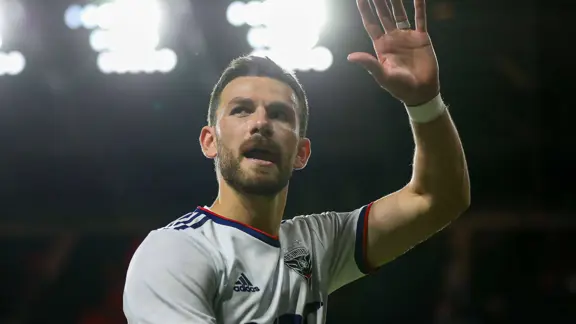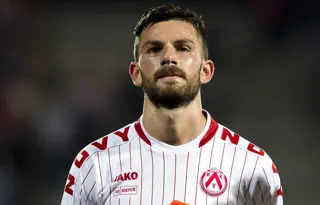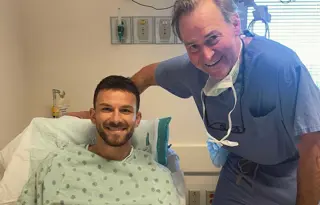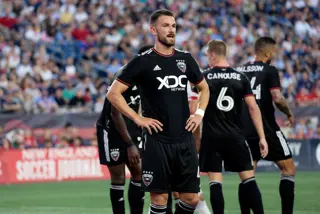Player Story
Brendan Hines-Ike: "The little battles that you win end up taking you a lot further"

DC United defender Brendan Hines-Ike (28) opens up about suffering serious back-to-back injuries that threatened to end his playing career.
By Brendan Hines-Ike
In football, everything happens for a reason. Whether it's the worst thing that could ever happen or the best thing, it's for a reason.
My three years at KV Kortrijk in Belgium felt like a full life's experience. I had the fairytale beginning and a nightmare ending. I was the most expensive signing in the club’s history, I was playing all the games and doing well. Then, the manager got fired.
Everything changed and I lost my spot in the team. I had never been in that position before. I had played pretty much every minute in college, and in Sweden.
When you don’t play for three months, it feels like years. You start to panic: I'm losing so much time, I have to get back into the team. I was going through all the negatives versus the positives: the manager doesn't like me, the club doesn't want me; but the club paid a record transfer fee, so obviously they want me.
I had conversations with my wife, my parents, and my agent, but they didn’t know what it's like to be in that locker room each day. And players in Europe are not there to help you: it's cut-throat over there.
I talked a lot with myself, and the devil was winning a lot of times. I wasn’t training properly anymore; I was trying to show that I didn’t want to be there. I thought to myself, if this is how my football career is going to be, then I don't want to play anymore. It wasn't fun.

Then, suddenly, DC United wanted me. The coach called me the day we found out we were pregnant with our daughter. It felt like the most unbelievable timing; maybe this was my second chance because it had been really dark for a while.
DC United felt like a refreshing change. I was flying, playing good football. I was so happy. And then, bang! I broke my left hip in a game that we were winning 7-1. Can you imagine?
I had a severe hip fracture and the club arranged surgery. But I did my research and spoke with 13 doctors. One day before the operation was due to take place, I got a call from a renowned specialist. He said: “Please tell me you haven't had the surgery – cancel it!” So I did. If I would've had that surgery, my career would be over. I ended up only being four months out, which felt like an eternity, but I ended up coming back at the end of the season and I felt good.
In the following season, I started the first six games. I was getting settled and then the manager was fired. Wayne Rooney then came in as the new manager. I felt like this was an amazing chance; I felt another boost of confidence and I was playing good football again.
But then, in a match, I took a step backwards, my foot got stuck, and a ligament in the middle of my foot – the Lisfranc – snapped. One of the trainers said: “Your hip injury was one of the rarest I’ve seen in sports, but what you have now is maybe even rarer. I think it’s really bad.”
I read that a majority, if not all athletes, who suffer this injury end up retiring. I couldn’t believe I had to go through all this again; another four months out. Little did I know that it would end up being a 10-month journey.
I found a doctor who is regarded as the best in this field. “I'll fix it for you,” he said. “I’ll put one screw right through the middle of your foot, it will stay there forever, and this is your recovery time, but I cannot guarantee that you'll come back. I have NFL guys who still have pain.”
The recovery was a grind. Every day you come in, do the exact same thing for five hours, and then go home.

At home, I just couldn’t sit on the couch and do nothing. We had a one-year-old causing all these messes, while my wife was trying to do all these other things. As a husband and a father, I had to help, especially because my wife - together with my parents - was a major factor in keeping my motivation through my injuries. But every time I walked, I felt the pain.
That hurts your brain: I’m 28-years old, I want to run in the park with my daughter and go on walks with my wife, but I couldn’t. I had to crawl to the bedroom at night. You start to think, am I ever going to play again?
During recovery I took each day as it came, instead of setting goals that might be unrealistic. It was better for my head because there was no expectation.
After six months, we had a training camp in California. I was in my cleats and starting to move a little bit: running, passing, but the pain was immense. I told the physio, “This can’t be right – I feel worse than six months ago. I can't continue with this pain. Why don't we pull out the screw?”
I had read stories about guys who pulled the screw out and had success with it. But the doctor was against it.
Our physio knew a former head physio at Liverpool who told us that we had to pull the screw – if footballers keep the screw in, they'll never be themselves again. The specialist warned me that if the screw came out and my foot was still hurting, that he couldn't put another screw in. But I took the decision to pull it out. I was not letting someone else make that decision for me. The next day, I took a flight to get it done.
When I first started running, it hurt like hell. But it was a different kind of pain. It was a relief: okay, this is going to suck, but I'll deal with it. And after almost two months, I went for a walk after training, and I felt like a normal person again. It was surreal.
When I returned to the matchday squad, I remember sitting on the bench thinking to myself, please, don't put me in. I remember warming up and thinking that my foot wasn’t ready; I don't know if my foot wasn't ready or if my brain was freaking out.
But when I had to sit for four, five games, I started to think: why am I not playing? I felt ready. It’s funny how your mindset can shift.

The toughest moments in my career have been the moments I've looked back at with the most pride. I'm not a huge believer in saying, “trust the process”. However, if you start to look too far ahead in your career and in your life, then you start putting too many unnecessary expectations on yourself.
Instead, you should just do what you need to do each day and accomplish that to your fullest. Those little battles that you win end up taking you a lot further than you could have imagined.
As a footballer, you really have to love everything about the game. All that I went through, being forced out of a club, and then having back-to-back near career-ending injuries, if I didn't love the game, then I never would have put that much energy into coming back.
The moment that I don't have that motivation anymore, I'll stop instantly. I will always pay homage to the game and respect it because it can be taken away from you in the snap of a finger.
I could talk forever about the mental aspect of everything I went through, but I think that those three things are the best way to describe how I see my career and my path as a person. I'll take all those life lessons that I learned in those shitty times into the next stage of my life.
